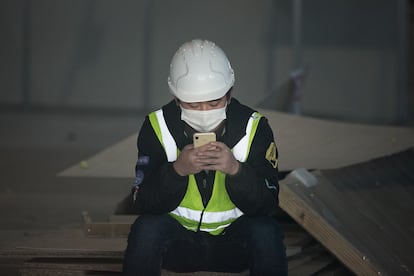Spain’s new coronavirus app could detect violators of lockdown rules
Sources say the information will not be used for this purpose, but rather to give users personalized responses on regional health protocols

The Spanish government has gone one step further in its fight to slow the spread of the coronavirus, and is now standing on the threshold when it comes to the protection of fundamental rights.
The State Secretary’s Office for Digitalization and Artificial Intelligence, which works under the Economy Ministry led by Nadia Calviño, has approved an initiative to authorize the development of a cellphone application that would give health authorities geolocation information about citizens, in order to provide them with more personalized health information.
In practice, it would also allow authorities to check whether individuals are following the rules of the coronavirus lockdown, which has confined Spaniards to their homes and prohibited all unnecessary travel.
The ministerial order, published in the Official Gazette (BOE) on March 28, gives the Health Ministry a series of powers to better control the spread of the virus. These include the “urgent development” of a cellphone app “to support the management of the health crisis caused by Covid-19.” The app aims to help users self-assess their symptoms and the likelihood of infection, and to provide them with information about the coronavirus and the next steps to follow based on their own assessment.
Under no circumstances will the app be used to control compliance of the lockdown measuresSources from the State Secretary's Office for Digitalization and Artificial Intelligence
But the order also outlines that the app “will allow [access to] users’ geolocation for the sole purpose of checking that they are in the region that they say they are in.” The app will validate – with a user’s permission – what region a person is in, and use this information to provide personalized responses based on the health protocols in the area, since in Spain, powers over healthcare are devolved to the regions.
The wording of the document means that the Health Ministry could potentially send personal WhatsApp messages to citizens if they are detected traveling to a different region. This could be done in an effort, for example, to crack down on weekend trips and travel to second residences.
Neither the Health nor the Economy Ministry have indicated that the proposed cellphone app might be used to check citizen’s GPS information during the lockdown, a power that could violate the Data Protection Law.
Sources from the State Secretary’s Office for Digitalization and Artificial Intelligence deny that the information will be used for this purpose. “All the information collected by the application is required in order to assess each person [in health-related issues]. Under no circumstances, will it be used to control compliance of the lockdown measures. Only health professionals and the relevant authorized authorities will have access to the data,” said these sources.
The personal data from the app will be kept for as long as the health crisis lasts, and once it is over, will be aggregated anonymously and used for statistical purposes, research, and public planning, for a maximum period of two years.
Health information
According to the BOE, the app will offer users recommendations and action guidelines based on the symptoms they are experiencing. But it will not act as a “service for diagnosis, emergency care or the prescription of pharmaceutical treatment,” nor replace “consultation with a qualified medical professional.”
The app will also feature an automatic message assistant to provide official information on the coronavirus via WhatsApp and other instant messaging services. The order also states that the app could include links to websites with more information on key topics.
Cellphone tracking
In addition to the app from the Health Ministry, the Economy Ministry announced on April 1 that more than 40 million cellphones in Spain would be tracked as part of a study called DataCovid, allowing authorities to follow the movements of the population between the country’s regions and helping inform decisions in connection with the coronavirus outbreak.
The study will analyze “anonymous and aggregated” data of Spanish residents’ movements while the health emergency continues, until normality returns. The reporting will not include personal data and will not be used by the police while the confinement measures are in place.
English version by Melissa Kitson.
Tu suscripción se está usando en otro dispositivo
¿Quieres añadir otro usuario a tu suscripción?
Si continúas leyendo en este dispositivo, no se podrá leer en el otro.
FlechaTu suscripción se está usando en otro dispositivo y solo puedes acceder a EL PAÍS desde un dispositivo a la vez.
Si quieres compartir tu cuenta, cambia tu suscripción a la modalidad Premium, así podrás añadir otro usuario. Cada uno accederá con su propia cuenta de email, lo que os permitirá personalizar vuestra experiencia en EL PAÍS.
¿Tienes una suscripción de empresa? Accede aquí para contratar más cuentas.
En el caso de no saber quién está usando tu cuenta, te recomendamos cambiar tu contraseña aquí.
Si decides continuar compartiendo tu cuenta, este mensaje se mostrará en tu dispositivo y en el de la otra persona que está usando tu cuenta de forma indefinida, afectando a tu experiencia de lectura. Puedes consultar aquí los términos y condiciones de la suscripción digital.









































